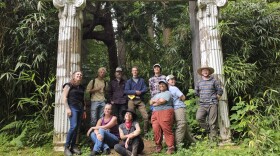-
2025 is behind us. It’s safe to say we live in interesting times. When you sift through all that took place last year, one thing stands out: people who create are going to create no matter the circumstances, and people like me will feel compelled to express our opinions about it. For me, that means music.
-
Proliferating AI is overloading our already overloaded power grids that are now buckling beneath skyrocketing computational demands to process all those bits and bytes so that we can have AI-generated pictures of Donald Trump hugging a kitten or riding astride a majestic lion as well as entirely AI-generated short films with thoughtful titles like Broccoligeddon and Drinking Gasoline.
-
Fancy cocktails seem ubiquitous these days, with everyone trying to put their own spin–with what seems like as many ingredients as possible–into a chilled glass for a premium price. Much of this rise to fame and expansion of our boozy palate can be attributed to pioneering cocktail historian and enthusiast, David Wondrich.
-
As we look ahead to the challenges and opportunities of a new year, it’s becoming clear that our work to preserve independent public broadcasting stations, along with NPR and PBS, as vital institutions of our democracy and our culture has only just begun.
-
The Martin family went missing on December 7, 1958 after heading east from Portland in search of greenery for holiday wreaths. The following spring, the bodies of two of the three daughters were recovered from the Columbia River but, despite search efforts, the fate of the rest of the family remained a mystery. Fast forward several decades to 2025, and enter Archer Mayo: artist and professional diver with a penchant for solving mysteries.
-
This fall there have been some intriguing new full-length releases we’ve been spinning on Open Air.
-
Many of today’s most popular generative AI systems like OpenAI’s ChatGPT, Google’s Gemini, and Anthropic’s Claude still utilize WIMP for interaction with users typing prompts into a GUI. But that’s rapidly being replaced by humans interacting with AI systems using spoken language.
-
Summertime is peach, tomato, and archaeology season! While investigations happen throughout the year, field schools, public outreach, and big excavations peak during the warmer months. By fall, our boots are dusty, feet are sore, and labs are overflowing with the summer’s haul.
-
I was very excited to hear about the 2025 Southern Oregon Lavender Festival, which takes place in summer over two weekends: once in June and once in July. It was the perfect excuse for me to continue exploring this beautiful region. Spending a lovely, sunny July day driving around the Applegate with my dog, Herbie, and visiting friendly, family-run lavender farms sounded just about perfect to me.
-
The loss of all federal funding with little advance notice has rocked the public media ecosystem. Hardest hit are stations serving small, rural communities which reach less wealthy parts of the country and which need to support and maintain expensive infrastructures because their audiences are spread across larger geographic areas – stations just like JPR.

Play Live Radio
Next Up:
0:00
0:00
Available On Air Stations








